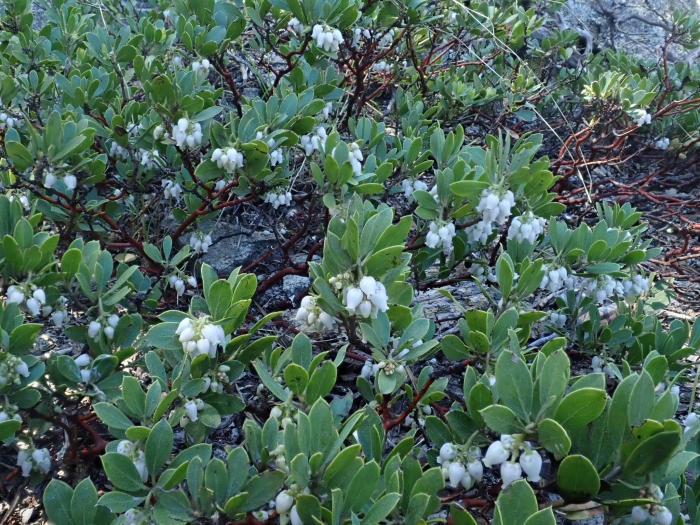Pinemat Manzanita
(Arctostaphylos nevadensis)
Pinemat Manzanita (Arctostaphylos nevadensis)
/
/

joergmlpts
CC BY 4.0
Image By:
joergmlpts
Recorded By:
Copyright:
CC BY 4.0
Copyright Notice:
Photo by: joergmlpts | License Type: CC BY 4.0 | License URL: http://creativecommons.org/licenses/by/4.0/ | Rights Holder: joergmlpts | Publisher: iNaturalist | Date Created: 2019-07-06T10:53:52-07:00 |













































































Estimated Native Range
Summary
Arctostaphylos nevadensis, commonly known as Pinemat Manzanita, is an evergreen subshrub or shrub native to the mountainous regions of California and Oregon, particularly in the Sierra Nevada and Cascade ranges. It thrives in subalpine zones and open coniferous forests, often found in dry, rocky soils. This species typically forms low, spreading mats or mounds that rarely exceed half a meter in height, adapting well to its native rugged terrain. The larger branches exhibit a distinctive dull red bark, while the younger twigs are often woolly. Its leaves are bright green, shiny, and can be nearly hairless, with some hairs along the edges, measuring 1 to 3 centimeters in length. Pinemat Manzanita is notable for its spherical clusters of urn-shaped, whitish flowers that bloom and are particularly attractive to pollinators. Following the flowering season, it produces spherical drupes approximately 7 millimeters wide.
Pinemat Manzanita is valued for its low maintenance, drought tolerance, and ability to stabilize soil on mountain slopes, making it an excellent choice for chaparral landscaping and erosion control. It is also appreciated for its ornamental qualities, including its attractive bark and foliage. In cultivation, it requires full sun exposure and well-drained soils, with very low to low water needs once established. While it is generally disease-resistant, it can be susceptible to root rot in poorly drained soils. Gardeners should be aware that this species can be difficult to transplant due to its sensitivity to root disturbance.CC BY-SA 4.0
Pinemat Manzanita is valued for its low maintenance, drought tolerance, and ability to stabilize soil on mountain slopes, making it an excellent choice for chaparral landscaping and erosion control. It is also appreciated for its ornamental qualities, including its attractive bark and foliage. In cultivation, it requires full sun exposure and well-drained soils, with very low to low water needs once established. While it is generally disease-resistant, it can be susceptible to root rot in poorly drained soils. Gardeners should be aware that this species can be difficult to transplant due to its sensitivity to root disturbance.CC BY-SA 4.0
Plant Description
- Plant Type: Subshrub, Shrub
- Height: 1-1.5 feet
- Width: 3-5 feet
- Growth Rate: Moderate
- Flower Color: White
- Flowering Season: Summer, Spring
- Leaf Retention: Evergreen
Growth Requirements
- Sun: Full Sun, Part Shade
- Water: Very Low, Low
- Drainage: Fast, Medium
Common Uses
Bee Garden, Bird Garden, Butterfly Garden, Deer Resistant, Drought Tolerant, Edible*Disclaimer: Easyscape's listed plant edibility is for informational use. Always verify the safety and proper identification of any plant before consumption., Fire Resistant, Groundcover, Hummingbird Garden, Low Maintenance, Rock Garden, Street Planting
Natural Habitat
Native to subalpine zones and open coniferous forests in the Sierra Nevada and Cascade ranges of California and Oregon
Other Names
Common Names: Snowmat Manzanita, Nevadamjölon
Scientific Names: , Arctostaphylos nevadensis, Arctostaphylos pungens subsp. nevadensis, Uva-ursi nevadensis,
GBIF Accepted Name: Arctostaphylos nevadensis A.Gray